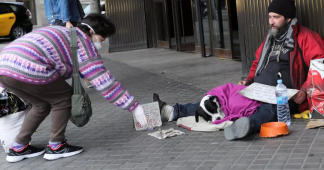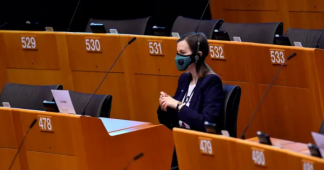The three ministers stress that Europe is currently facing the “greatest challenge since World War II”: fighting the covid-19 pandemic, saving as many lives as possible.
8 May 2020
The proposal, published today in the Público newspaper, is defended in a joint text signed by the Minister of Labor, Solidarity and Social Security of Portugal, Ana Mendes Godinho, by the Vice President of the Government of Spain, Minister of Social Rights and Agenda 2030, Pablo Iglesias, and by the Minister of Labor and Social Policies of Italy, Nunzia Catalfo.
“It is necessary to ensure that all people are guaranteed the satisfaction of their basic needs. For that, we need a common system of minimum income that will make it possible to combat poverty and social exclusion in an ambitious and integrated perspective ”, the government officials say in the article entitled“ Towards a European minimum income ”.
The three subscribers to the article say that the European Union lacks a common minimum income framework, which is not limited to levels of survival or the poverty ratio calculated from the average European income, but rather is a legally binding framework, which allow all member states to establish a minimum income, adequate and adapted to the level and lifestyle of each country.
“We support the approach that has been taken in this crisis, which is based on the fact that nobody is left behind and that pays particular attention to the most vulnerable groups. For this reason, we support the establishment of an initiative to support the generalization of decent and adequate minimum income systems in all Member States ”, they defend.
The three ministers stress that Europe is currently facing the “greatest challenge since World War II”: fighting the covid-19 pandemic, saving as many lives as possible.
The social and economic impacts of this crisis, they write, are beginning to be felt at national and European level, with a particular focus on the labor market, with profound impacts on the lives of citizens.
“This is the time for the European Union to look to the future and continue its program, with a view to presenting an action plan for the implementation of the European Pillar of Social Rights and, thus, launching a ‘European social shield'” , they state.
The three ministers highlight the “most vulnerable groups” and the need for “ambitious and courageous” solidarity measures to avoid the risk of poverty and social exclusion.
“Europe today has more than 113 million people at risk of poverty and social exclusion and 25 million children living below the poverty line. It is necessary to adopt urgent measures to prevent the increase in this number and, instead, contribute to its reduction ”, they state.
For the governments who sign the text, the situation is amplified by the pandemic of covid-19 and, therefore, requires global and integrated solutions, in addition to all the national measures in progress.
“Europe must unite around solidarity. A coordinated European response is needed to avoid a new economic and social crisis like the one we experienced after the 2008 crisis ”, they say in the text.
As a political and legislative framework, the article highlights the European Pillar of Social Rights, approved in 2017 by the European Parliament, the Council and the European Commission, during the Social Summit held in Gothenburg.
In Principle 14 of that document, the government recalls, it is stated that anyone who does not have sufficient resources is entitled to adequate minimum income benefits that guarantee a decent standard of living at all stages of life, as well as access support goods and services. For people able to work, minimum income benefits must be combined with incentives to (re) integrate the labor market.
The three underwriters, members of the governments of Lisbon, Madrid and Rome, recall that “Portugal was a pioneer at this level, having launched in 1996 the Minimum Guaranteed Income, currently called Social Insertion Income”.











